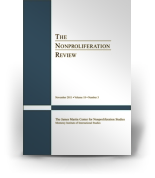
The Nonproliferation Review, the double-blind peer reviewed journal of the James Martin Center for Nonproliferation Studies concerned with the causes, consequences, and control of the spread of nuclear, chemical, and biological weapons, is now accepting submissions.
All submitted manuscripts that are accepted for publication are eligible to win the Doreen and Jim McElvany prize of $5,000, a $3,000 runner’s-up prize, or a $1,000 honorable mention prize. Due to the limited number of pages that we can publish in a single volume, eligible articles will be accepted for publication on a rolling basis. It is therefore in authors’ interest to submit early to ensure consideration for the prize.
Submissions must adhere to the Review Style Guidelines and be submitted through our online portal.
The Review welcomes manuscripts in three categories: articles (theoretical analyses and case studies); reports (discussions of new developments and emerging issues); and viewpoints (policy proposals and critiques and innovative opinion pieces). Articles should not exceed 10,000 words. Viewpoints and reports should not exceed 7,500 words. Book reviews should not exceed 4,000 words.
In addition, we welcome correspondence submissions in response to articles published in the NPR. Correspondence pieces are not peer reviewed, and should generally not exceed 2,000 words.
The editors will not consider manuscripts under simultaneous submission elsewhere. All material must be original.
Submissions must contribute new ideas and insights to the nonproliferation field. The Review‘s editors welcome submissions on any topic related to weapons proliferation, especially concerning chemical, biological, radiological, and nuclear weapons. Possible topics include activities and developments in international nonproliferation regimes; the effects of proliferation on strategic stability, society, or environment; new information about the policies or weapons programs of specific countries; the spread of knowledge, materials, or technologies with potential destructive applications; the influence upon strategic stability of emerging technologies, e.g., additive manufacturing, cyber operations, or counter-space weapons; measures to control proliferation, either existing or proposed; the causes of proliferation or nonproliferation; and the relevant activities of non-state actors, such as nongovernmental organizations or terrorists.
This list is not all-inclusive; authors are free to submit manuscripts on other topics that may be of interest to the nonproliferation community.
For insight into the peer-review process for the journal, please review our optional Peer Review Form (.DOC format), which outlines the four main areas peer reviewers are asked to consider: relevance, originality, coherence, and support. Note that viewpoints undergo a less rigorous peer-review process than articles, and correspondence and book reviews are exempted from peer review entirely.
If an author has signed a non-disclosure agreement that remains in force and is relevant to the contents of a manuscript, it is the author’s responsibility to obtain approval for publication before submitting the manuscript for consideration.
View the full Nonproliferation Review Submissions and Style Guidelines.
For any questions not addressed in that document or this one, please contact Managing Editor Daniel Horner (dhorner [at] middlebury.edu).
